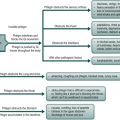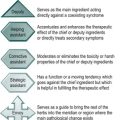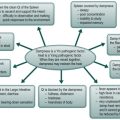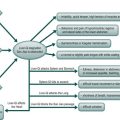Chapter Six. Syndrome of abnormal discharge and formula composition
CHAPTER CONTENTS
CHAPTER OUTLINE
This chapter introduces the principles, methods and strategies for the composition of formulas that stabilize the body essence, body fluids, blood and Qi. They are used to treat abnormal discharge of the essential substances of the body and abnormal consumption of the Qi. They can also be used for the composition of formulas that stabilize the structure of the internal organs, which slip from their normal places when the Qi is deficient.
Syndrome of abnormal discharge
Manifestations
Main symptoms
Excessive sweating, severe cough, shortness of breath, asthma, palpitations, uterine bleeding, spermatorrhea, premature ejaculation, large amount of leukorrhea, incontinence of urine, enuresis, diarrhea, prolapse of rectum and uterus.
Tongue
Pale or dull-pale, with a white coating.
Pulse
Rapid, restless or deep and weak.
Associated disorders in western medicine
Asthma, pulmonary emphysema, chronic bronchitis, hyperventilation, arrhythmia, tachycardia, insomnia, colitis, chronic enteritis, dysentery, food allergy, premature ejaculation, spermatorrhea, urinary incontinence and enuresis.
Analysis of the syndrome
The essence, fluids, blood and Qi are the basic substances of the body. They support the physiological functions of the internal organs and should be protected from abnormal leakage and consumption.
The direct cause of abnormal discharge of the essential substances is Qi deficiency.
• When the Qi of the internal organs is very weak, and is not able to keep the essence and fluids in the body and the organs in their proper places, abnormal discharge or so-called leakage occurs. Elderly people and people with chronic diseases or with a very weak constitution are more likely to have this disorder.
• When Lung-Qi and Kidney-Qi are weak, breathing becomes shallow and quick, and patients may also suffer from cough and wheezing.
• When the Defensive-Qi is weak, patients sweat profusely.
• When Heart-Qi is weak, patients may have palpitations, anxiety and restlessness.
• When Kidney-Qi and Kidney-Yang are weak, premature ejaculation, spermatorrhea, incontinence, enuresis and diarrhea may be present.
• The deficiency of Spleen-Qi may cause diarrhea, bleeding, a large amount of leukorrhea, and prolapse of uterus, rectum or other internal organs.
• A pale tongue with a white coating and a rapid pulse indicate Qi deficiency.
(See Figure 6.1 on page 200.)
Treatment principle: Stabilize the essence, fluids, blood and Qi; tonify and regulate the Qi
Herb selection principles and formula composition strategies
• The first priority is to select sour, astringent and calcined herbs to directly stabilize the essence, fluids, blood and Qi in order to stop their abnormal discharge and prevent further discharge.
• Along with these, it is equally important to select herbs that tonify and stabilize the Qi, blood, Yin and Yang in order to treat the cause of the syndrome and enhance the ability of the stabilizing and binding herbs.
• Herbs that have a sweet taste and can reduce the intensity of the abnormal discharge can be used.
• Herbs that regulate the function of the internal organs, especially Qi movement, should be used to prevent stagnation caused by the sour and astringent substances.
CAUTIONS
1. Make sure there are no excess pathogenic factors in the body:
The formulas that stabilize and bind are only used in deficiency conditions. There should be no exterior pathogenic factors or phlegm, dampness or blood stagnation in the body. Otherwise, they may retain the pathogenic factors in the body.
2. Make a correct differentiation:
There are many factors that can cause abnormal discharge of the body fluids and essence besides Qi deficiency. For example, diarrhea can be caused by damp-heat in the intestines; excessive urination or spermatorrhea can be the result of damp-heat in the Lower-Jiao; shortness of breath can be the consequence of phlegm accumulation; excessive sweating is often caused by excess heat or empty-heat in the body. Thus a correct differentiation of the syndrome is required.
3. Use only in acute and severe conditions for a reasonably short time:
The formulas that stabilize abnormal discharge of the essential substances focus on treating the manifestations. As they do not have sufficient function to treat the cause of the disorder, they are only used for a short period of time. When the abnormal discharge stops, formulas that tonify should be used in the first instance, or tonifying herbs should be added to the original formulas.
Structure of the formula and selection of herbs
Chief: Directly stop abnormal discharge
Most of the herbs that stabilize the essence, body fluids, blood and Qi are sour or astringent. Herbs with a sour taste have a contracting ability and inward-moving tendency; herbs with astringent properties are able to prevent or reverse abnormal discharge of essence, body fluids and Qi. When herbs are calcined, they develop an astringent property. This procedure is particularly useful in acute conditions.
Wu Wei Zi ( Schisandrae fructus), Wu Mei ( Mume fructus), He Zi ( Chebulae fructus) and Bai Guo ( Ginkgo semen)
These herbs are particularly able to stabilize the Lung-Qi. They are used to relieve thirst, shortness of breath and chronic cough. They are used in conditions of sudden or severe Qi scattering and fluid consumption of the Lung.
Ma Huang Gen ( Ephedrae radix)* and Nuo Dao Gen Xu ( Oryzae glutinosae radix et rhizoma)
These herbs specialize in stabilizing the exterior and can effectively stop sweating.
Wu Wei Zi ( Schisandrae fructus), Fu Xiao Mai ( Tritici fructus germinatus), Mu Li ( Ostrea concha) and Long Gu ( Mastodi fossilium ossis)
These substances are particularly effective in stabilizing the Heart-Qi. They are used to treat palpitations, restlessness, spontaneous sweating, night sweats and insomnia. Of these herbs, Mu Li is particularly effective for treating night sweats; Fu Xiao Mai and Long Gu can treat both night sweats and spontaneous sweating.
Shan Zhu Yu ( Corni fructus), Wu Wei Zi ( Schisandrae fructus), Wu Zei Gu ( Sepiae seu sepiellae os), Qian Shi ( Euryalis semen), Fu Pen Zi ( Rubi fructus), Lian Zi ( Nelumbinis semen) and Lian Xu ( Nelumbinis stamen)
These are the substances that particularly stabilize the Kidney-essence. They are used in the treatment of frequent night urination, enuresis, spermatorrhea and premature ejaculation in conditions of Kidney-Yang or Kidney-Qi deficiency.
Wu Mei ( Mume fructus), Wu Bei Zi ( Chinensis galla), Ying Su Ke ( Papaveris somniferi pericarpium), Qian Shi ( Euryalis semen), Rou Dou Kou ( Myristicae semen), He Zi ( Chebulae fructus), Chi Shi Zhi ( Halloysitum rubrum), Lian Zi ( Nelumbinis semen), Fu Long Gan ( Terra flava usta) and Jin Ying Zi ( Rosae laevigatae fructus)
These herbs bind up the intestines and are used to treat chronic diarrhea or heavy diarrhea due to deficiency of Spleen-Qi, Spleen-Yang, Kidney-Qi and Kidney-Yang.
Qian Shi ( Euryalis semen), Jin Ying Zi ( Rosae laevigatae fructus), Sang Piao Xiao ( Mantidis oötheca), Shan Zhu Yu ( Corni fructus) and Yi Zhi Ren ( Alpiniae oxyphyllae fructus)
These substances are particularly effective in stabilizing the Bladder and are used to stop frequent urination, a large amount of urine, incontinence of urine and enuresis in the syndrome of Kidney-Qi deficiency.
Duan Mu Li (calcinated Ostrea concha) and Duan Long Gu (calcinated Mastodi fossilium ossis)
After being calcined, these minerals develop an astringent nature. They can stabilize the essential substances of the body and prevent leakage.
Deputy: Tonify Qi, Yin and Yang of the related organs
Ren Shen ( Ginseng radix), Mai Men Dong ( Ophiopogonis radix), Bei Sha Shen ( Glehniae radix) and Sheng Huang Qi (raw Astragali radix)
These herbs are often used to tonify the Qi and nourish the Yin of the Lung when shortness of breath and cough are caused by Lung-Qi deficiency.
Ren Shen can strongly tonify the Lung-Qi and Kidney-Qi and therefore smooth the breath. Mai Men Dong and Bei Sha Shen can nourish the fluid and Yin of the Lung, and relieve dry cough, thirst and chest pain. Their function of generating Yin can be increased by Ren Shen.
If spontaneous sweating is present and is obviously caused by deficiency of Spleen-Qi and Defensive-Qi, Sheng Huang Qi can be selected in the formula to strengthen and ascend the Qi, stabilize the exterior and stop the sweating.
Zhi Gan Cao ( Glycyrrhizae radix preparata), Suan Zao Ren ( Ziziphi spinosae semen), Fu Shen ( Poriae cocos pararadicis) and Mai Men Dong ( Ophiopogonis radix)
In a syndrome of Heart-Qi deficiency, astringent herbs should be prescribed with herbs that tonify the Qi and Yin of the Heart and calm the mind. Zhi Gan Cao and Fu Shen can tonify the Heart-Qi and calm the mind. Suan Zao Ren can nourish the blood, stabilize the Yin, improve sleep and therefore calm the mind. Mai Men Dong can nourish the Heart-Yin and the sweet Zhi Gan Cao and sour Suan Zao Ren can enhance its function.
Huang Qi ( Astragali radix), Bai Zhu ( Atractylodis macrocephalae rhizoma), Fu Ling ( Poria) and Bai Bian Dou ( Dolichoris lablab semen)
These herbs can be used in the formula to treat diarrhea and prolapse of internal organs due to Spleen-Qi deficiency.
Huang Qi has the function of tonifying and lifting the Qi, and is a perfect herb to be used in the treatment of diarrhea and prolapse of the rectum caused by deficiency and sinking of Spleen-Qi. It can also improve the condition of the muscles and treat tiredness.
Bai Zhu and Fu Ling are able to tonify the Spleen-Qi and dry dampness. They are particularly selected in the formula when dampness accumulates in the Middle-Jiao caused by Spleen-Qi deficiency.
Bai Bian Dou is bland and neutral. It can gently tonify the Spleen-Qi and is used in mild and chronic conditions of Spleen-Qi deficiency. It is also an astringent herb, and can stabilize the Qi and Yin in the Middle-Jiao. It is often selected to treat chronic diarrhea when the Qi and Yin are both weakened in the Middle-Jiao.
Gan Jiang ( Zingiberis rhizoma), Gui Zhi ( Cinnamomi cassiae ramulus), Sha Yuan Zi ( Astragali complanati semen), Tu Si Zi ( Cuscutae semen) and Rou Gui ( Cinnamomi cassiae cortex)
These herbs can be added to formulas when the abnormal discharge is caused by Yang deficiency.
Gan Jiang is used particularly to warm the Spleen and treats diarrhea due to Spleen-Yang deficiency, which is manifested as thin, watery feces without smell, worsening after taking cold food and drinks, no abdominal pain but with a cold sensation in the abdomen.
Gui Zhi enters the Heart, Bladder and Lung meridians, can warm the Yang and accelerates the steaming process of water changing into Qi. It can therefore reduce frequent urination, wheezing and cough with a large amount of cold-phlegm.
Sha Yuan Zi, Tu Si Zi and Rou Gui particularly warm the Kidney-Yang. They can be selected in conditions of frequent urination in the night, enuresis, impotence, spermatorrhea and premature ejaculation due to Kidney-Yang deficiency.
Dang Gui ( Angelicae sinensis radix), E Jiao ( Asini corii colla) and Bai Shao Yao ( Paeoniae radix lactiflora)
These three substances are able to nourish blood and moisten dryness. E Jiao can directly stop bleeding. Bai Shao Yao can stabilize the blood due to its sour and cold properties. These substances are often used in the formula to treat bleeding due to blood deficiency.
Assistant: Regulate the Qi
Chai Hu ( Bupleuri radix), Xiang Fu ( Cyperi rhizoma), Bai Shao Yao ( Paeoniae radix lactiflora) and Zhi Gan Cao ( Glycyrrhizae radix preparata)
If there is Liver-Qi stagnation in the syndrome, this is often revealed by tension in the symptoms, such as severe palpitations, shortness of breath, abdominal cramp, urgent and frequent urination and diarrhea.
Chai Hu can disperse and spread the suppressed Liver-Qi. Xiang Fu can regulate the Liver-Qi and smooth the movement. The sour Bai Shao Yao and sweet Zhi Gan Cao can soften the Liver, ease the tendons and reduce the tension. They are often used in herbal formulas.
Qian Hu ( Peucedani radix) and Pi Pa Ye ( Eriobotryae folium)
These herbs can descend the Lung-Qi and transform phlegm. They can be used as assistants in the condition where the Lung-Qi fails to disperse or descend and causes accumulation of phlegm in the Lung. They can also reduce the possibility that astringent herbs will obstruct the Lung-Qi and hold back phlegm.
Mu Xiang ( Aucklandiae radix)**, Sha Ren ( Amomi xanthioidis fructus) and Fang Feng ( Saposhnikoviae radix)
These herbs are able to regulate the Qi and eliminate dampness of the Spleen and Large Intestine. They are mainly used in the condition of diarrhea with distension of the abdomen that is caused by Qi and dampness accumulation.
Sang Piao Xiao ( Mantidis oötheca) and Yi Zhi Ren ( Alpiniae oxyphyllae fructus)
These substances are able to tonify the Kidney-Yang, separate the clear fluid from turbid water and treat frequent urination and enuresis.
Envoy: Harmonize the herbs in the formula
Zhi Gan Cao ( Glycyrrhizae radix preparata)
Zhi Gan Cao is sweet in nature and enters all meridians. It can harmonize the herbs in the formula, smooth their functions and moderate their temperatures and tastes. Moreover, it can also reduce the intensity of the progress of the disorder.
Examples of classical formulas
Yu Ping Feng San (Jade Windscreen Powder) 
Source: Da Xi Xin Fa 
Composition
Huang Qi ( Astragali radix) 30 g
Bai Zhu ( Atractylodis macrocephalae rhizoma) 60 g
Fang Feng ( Saposhnikoviae radix) 30 g
Analysis of the formula
This formula strengthens the Qi, stabilizes the exterior and stops sweating. It is used to treat weakness of the Defensive-Qi, which is unable to control the opening and closing of pores and causes spontaneous sweating, aversion to wind and easily catching a cold. Patients may often have a blocked nose, a pale complexion, a pale tongue with a white coating and a superficial but weak and soft pulse.
Commentary on strategies
This formula treats both the cause and the manifestations of the syndrome.
• The application of Fang Feng as the assistant of Huang Qi is very sensible. One is dispersing, the other is tonifying. With the help of Fang Feng, Huang Qi will not keep the wind in the body.
• Although it is a small formula, it is balanced in composition. It is very effective and often used in clinical practice to prevent catching cold in the winter.
Jiu Xian San (Nine-Immortal Powder) 
Source: Yi Xue Zheng Zhuan 
Composition
Ying Su Ke ( Papaveris somniferi pericarpium) 6 g
Ren Shen ( Ginseng radix) 2 g
E Jiao ( Asini corii colla) 2 g
Wu Wei Zi ( Schisandrae fructus) 2 g
Wu Mei ( Mume fructus) 6 g
Kuan Dong Hua ( Tussilaginis farfarae) 2 g
Chuan Bei Mu ( Fritillariae cirrhosae bulbus) 2 g
Jie Geng ( Platycodi radix) 2 g
Sang Bai Pi ( Mori cortex) 2 g
Analysis of the formula
This formula can stabilize the Lung-Qi and is used to treat chronic cough, which consumes much of the Qi and Yin of the Lung. Patients sweat easily and often have a weak and rapid pulse.
In this formula:
• Ying Su Ke and Ren Shen are used as chief. The former stabilizes the Lung-Qi directly; the latter can tonify the Qi of the Lung and Kidney, and therefore stabilizes the Lung-Qi. They are used together to treat both the cause and the manifestations of the syndrome.
• The deputies in this formula are E Jiao, Wu Wei Zi and Wu Mei. E Jiao can nourish the Yin and moisten the Lung; Wu Wei Zi and Wu Mei can stabilize the Lung-Qi and stop cough.
• The remaining herbs in the formula are assistants. Kuan Dong Hua and Chuan Bei Mu eliminate the phlegm and stop cough. Sang Bai Pi descends the Lung-Qi and Jie Geng ascends the Lung-Qi. They regulate the Lung-Qi and relieve cough.
When all these herbs are used together, the Lung-Qi is stabilized and strengthened, and the cough stops.
Commentary on strategies
This formula represents the methods of treating chronic cough.
• Herbs that tonify the Qi and herbs that stabilize the Qi are used together.
• At the same time, herbs that regulate the Lung-Qi and eliminate phlegm are used following the pathological change in the Lung.
Si Shen Wan (Four-Miracle Pill) 
Source: Zheng Zhi Zhun Sheng 
Composition
Bu Gu Zhi ( Psoraleae fructus) 120 g
Wu Zhu Yu ( Evodiae fructus) 30 g
Rou Dou Kou ( Myristicae semen) 60 g
Wu Wei Zi ( Schisandrae fructus) 60 g
Sheng Jiang ( Zingiberis rhizoma recens) 240 g
Da Zao ( Jujubae fructus) 100 pieces†
Analysis of the formula
This formula can warm and tonify the Spleen and the Kidney, bind up the intestines and stop diarrhea. It is used to treat weakness of the Yang of Spleen and Kidney. The water accumulates in the intestines and causes diarrhea. The diarrhea usually occurs before sunrise every day. This can be explained by the Yang of nature enhancing the Yang of the body, and the Yang is strong enough to eliminate the damp-cold in the intestines. Patients often have a poor appetite, weak legs, knees and back, a pale tongue with a white coating, and a deep and weak pulse.
In this formula:
• Bu Gu Zhi is used as chief. It is very warm, bitter and pungent, and enters the Kidney meridian, especially the vital gate. It can strengthen and warm the Yang and indirectly warm the Spleen.
• Wu Zhu Yu and Rou Dou Kou, as deputies, are pungent and warm, and enter the Spleen meridian. They can warm the Spleen and expel cold there. Rou Dou Kou can eliminate dampness and directly stop diarrhea.
• The assistants are Wu Wei Zi, Sheng Jiang and Da Zao. Wu Wei Zi can stabilize the food essence and stop diarrhea; Sheng Jiang and Da Zao are used for strengthening the function of the Spleen.
When all the herbs are used together, the Middle- and Lower-Jiao are warmed and strengthened, and diarrhea stops.
Commentary on strategies
This is a small formula, but it is strong and effective in function. It treats the cause and manifestations together, and treats the Middle- and Lower-Jiao together. It is an appropriate formula for studying the strategies of composition and treatment methods.
Jin Suo Gu Jing Wan (Metal Lock Pill to Stabilize the Essence) 
Source: Yi Fang Ji Jie 
Composition
Sha Yuan Zi ( Astragali complanati semen) 60 g
Qian Shi ( Euryalis semen) 60 g
Lian Xu ( Nelumbinis stamen) 60 g
Duan Long Gu (calcined Mastodi fossilium ossis) 30 g
Duan Mu Li (calcined Ostrea concha) 30 g
Lian Zi ( Nelumbinis semen) 120 g
Analysis of the formula
This formula stabilizes the Kidney and binds up the semen. It is used to treat deficiency of the Kidney, which is unable to control the semen. Patients suffer from abnormal spermatorrhea and long-term impotence, and often feel tired, have tinnitus, a weak and sore lower back and legs, a pale tongue with a white coating, and a weak and thready pulse.
In this formula:
• Sha Yuan Zi, as chief, is sweet, warm and moist in nature, and enters the Spleen and Liver meridians. It can tonify the essence, strengthen the Kidney-Yang and treat the cause of the syndrome.
• Lian Zi and Qian Shi are astringent and are used as deputies to stabilize the semen directly and treat the manifestations of the syndrome.
• Duan Long Gu and Duan Mu Li are astringent after being calcined and are used as assistants to stabilize the semen and enhance the ability of the deputies.
• Lian Xu is another assistant. It is sweet, neutral and astringent, and enters the Kidney and Bladder meridians. Lian Xu is the first choice for stabilizing the semen and treating spermatorrhea and premature ejaculation.
Commentary on strategies
• This formula is based on a large amount of astringent substances. In particular, when Long Gu and Mu Li are calcined by fire, they develop an astringent property and are used for stabilizing and binding the essential substances in the body.
• In clinical practice, to treat a chronic condition, tonifying herbs should be added to this formula.
Gu Chong Tang (Stabilize Chong Meridian Decoction) 
Source: Yi Xue Zhong Zhong Can Xi Lu 
Composition
Bai Zhu ( Atractylodis macrocephalae rhizoma) 30 g
Huang Qi ( Astragali radix) 18 g
Bai Shao Yao ( Paeoniae radix lactiflora) 12 g
Shan Zhu Yu ( Corni fructus) 24 g
Duan Long Gu (calcined Mastodi fossilium ossis) 24 g
Duan Mu Li (calcined Ostrea concha) 24 g
Wu Zei Gu ( Sepiae seu sepiellae os) 12 g
Wu Wei Zi ( Schisandrae fructus) 1.5 g
Zong Lü Tan (charred Stipulae trachycarpi fibra) 6 g
Qian Cao Gen ( Rubiae radix) 9 g
Analysis of the formula
This formula is able to strengthen the Middle-Jiao and stop uterine hemorrhage due to Spleen-Qi deficiency. In this syndrome, the Spleen is unable to keep the blood moving in its normal pathway, and bleeding starts. Afterwards, the blood and Yin of the Liver are weakened. Patients suffer from heavy menstrual bleeding, the blood is thin and the color is light. The accompanying symptoms are palpitations, shortness of breath, a pale tongue, and a thready and weak pulse.
In this formula:
• Bai Zhu and Huang Qi are used in large dosages as chief herbs. They strongly tonify the Spleen-Qi so as to control the blood. Huang Qi can also ascend and hold the Qi, and stop bleeding. They are used to treat the cause of bleeding.
• Bai Shao Yao and Shan Zhu Yu, as deputies, treat the cause as well as the manifestations of the syndrome. They are sour in taste and enter the Liver meridian. They can tonify the blood and Yin of the Liver. Shan Zhu Yu is used in a very large dosage, and can powerfully and effectively stabilize the blood and stop bleeding.
• Duan Long Gu and Duan Mu Li serve as assistants. They are astringent substances and can stabilize the blood directly and stop bleeding . Wu Zhi Gu, Wu Bei Zi and Zong Lü Tan are also astringent. As assistants, they enhance the ability of the other herbs in the formula to stop bleeding.
• Since there are a number of astringent substances that may cause stagnation, Qian Cao Gen is used as corrective assistant. It can stop bleeding yet promote blood circulation. At the same time, it can also remove congealed blood.
Commentary on strategies
• This is a formula that treats both the cause and the manifestations of bleeding syndrome due to Spleen-Qi deficiency.
• The use of Qian Cao Gen shows how to prevent and treat blood stagnation caused by astringent substances.
Shi Hui San (Ten Partially-Charred Substances Powder) 
Source: Shi Yao Shen Shu 
Composition
Da Jì ( Cirsii japonici herba seu radix)
Xiao Ji ( Cirsii herba)
He Ye ( Nelumbinis folium)
Ce Bai Ye ( Platycladi cacumen)
Bai Mao Gen ( Imperatae rhizoma)
Qian Cao Gen ( Rubiae radix)
Zhi Zi ( Gardeniae fructus)
Da Huang ( Rhei rhizoma)
Mu Dan Pi ( Moutan cortex)
Zong Lü Pi ( Petiolus trachycarpi)
Herbs in the formula are without dosage as this is not recorded in the source book. They should be applied in even dosage.
Analysis of the formula
This formula is used to cool the blood and stop bleeding. It is used for acute bleeding in any part of the body. The cause is internal heat, which injures the blood vessels and pushes blood moving upwards and leaving its normal pathway.
In this formula:
• The chief herbs are Da Jì, Xiao Ji, Ce Bai Ye, Qian Cao Gen and Bai Mao Gen. These herbs are able to cool the blood and stop bleeding.
• The deputies are Zong Lü Pi, Zhi Zi and Da Huang. Zong Lü Pi is astringent and is able to stabilize the blood and help the chief herbs to stop bleeding. Zhi Zi and Da Huang clear the heat and thus can reduce the intensity of bleeding.
• Mu Dan Pi, on one hand, serves as helping assistant, together with Da Huang, to cool the blood and dissolve congealed blood; on the other hand, it serves as corrective assistant to disperse the congealed blood and regulate blood circulation, so as to prevent blood stagnation caused by all the cooling herbs.
• He Ye, like Mu Dan Pi, serves as both helping and corrective assistant. The partially charred He Ye, like other herbs, can stop bleeding. However, its light fragrant smell can also disperse the Qi and blood stagnation caused by the astringent herbs and the cold herbs.
Commentary on strategies
This formula treats the manifestations rather than the cause of the syndrome. Some special treatment of the herbs and administration should be mentioned. These particular procedures are devised to meet treatment need.
• First, all the herbs in the formula are partially charred. Through this process, the herbs gain astringent properties that can enhance the strength of stopping bleeding.
• Second, the partially charred herbs are ground to a fine powder, sealed in an earthenware container and buried in the earth for a night. This procedure reduces any fire nature that the herbs may have developed from the charring process, which is inappropriate for bleeding conditions.
• Third, before ingestion, the herbal powders are mixed with sweet radish juice and Chinese ink, which is made from charred cypress and pine with cooked sticky rice. This enhances their ability to stop bleeding.
• Since acute bleeding is unexpected, the formula is prepared and kept for emergency use. Chinese ink and radish are usually available in the home and the prepared formula should be used promptly.
These procedures suggest wider possibilities in the treatment of unexpected bleeding: people may quickly burn plants to black and put the powder on the wound to stop bleeding, or eat fresh vegetables to cool the blood.
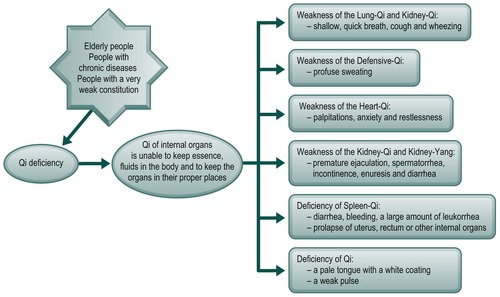 |
| Figure 6.1 •. |
| Etiology and pathology of the abnormal discharge syndromes. |

